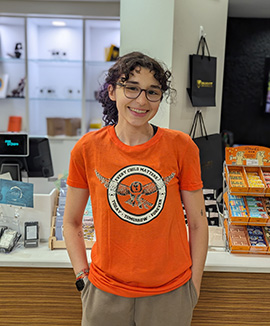For the third year in a row, the is selling Indigenous-made orange shirts to support the National Day for Truth and Reconciliation Day on Sept. 30. 
The store will contribute 100 per cent of profits from sales of the shirts to the in Halifax. The $25 shirts are being showcased in the bookstore until stock runs out to inspire students to support continuous reconciliation and healing with Indigenous peoples in Canada. 
‚ÄúEvery dollar counts because every child matters,‚ÄĚ says Derek Lewis, the mind behind the shirts.
Lewis is a treaty-holding Mi‚Äôkmaw and an enrolled member of the Millbrook (We‚Äôkopekwitk) First Nation, near Truro, Nova Scotia. He studied English and sociology at Īꔄtv before becoming the first Indigenous cell-phone game developer to license games in Canada. In 2004, Lewis owned and operated Red Arrow Digital College, a private career college helping Mi‚Äôkmaw students receive a post-secondary diploma. He later received a Master and Doctorate of Education.
The birth of an idea
To reconnect with his familiar creative instincts, Lewis started designing and screen printing again and, unexpectedly, the enterprise grew into a company. In 2018, was established. 
Lewis noticed that every year leading up to Sept. 30, Indigenous organizations wanted their orange shirts to be made in Canada with Indigenous involvement rather than a global distributor. He struggled to find one made in Canada.
In 2022, he approached , a Truro-based clothing manufacturer, with the idea of partnering to create Indigenous-made orange shirts. ≥ß≥Ŕ≤Ļ≤‘īŕĺĪĪūĪŰĽŚ‚Äôs gave the project the green light and granted Lewis the decision-making powers to determine the tone, weight, and 50/50 polycotton blend of the shirts.¬†
‚ÄúVery few colonial institutions give up their power when it comes to reconciliation. They may have Indigenous designs and Indigenous employees, but when push comes to shove, the decision makers are typically non-Indigenous,‚ÄĚ says Lewis.
‚ÄúTo see a very colonial company, older than the Dominion of Canada itself, work with a Mi'kmaw L‚Äônu clothing maker and come at it being equal, it says a lot about the company.‚ÄĚ
A powerful symbol
This Indigenous and settler collaboration arising locally in Truro marked a milestone for Canada ‚ÄĒ the first orange shirts for National Truth and Reconciliation Day completely made in Canada. The shirts are now distributed by ≥ß≥Ŕ≤Ļ≤‘īŕĺĪĪūĪŰĽŚ‚Äôs to various academic institutions across Nova Scotia, including Īꔄtv.¬†
Lewis says, ‚ÄúWhen we talk about reconciliation there is still a lot of healing that needs to be done.‚ÄĚ
The Orange Shirt Day movement began in 2013, with the idea originating from the story of Phyllis Webstad, a Shuswap woman whose new orange clothing was replaced with an institutional uniform on her first day at Residential School in 1973. Lewis dedicates his efforts to the generations before him like Webstad‚Äôs who ‚Äúnever had the opportunity to fulfill their full potential simply based on who they were.‚Ä̬†
 In Mi'kmaw culture, the owl is seen as a bird of wisdom, prophecy, and a symbol of healing. The orange shirts being sold in the Īꔄtv Bookstore feature Lewis‚Äôs design with an owl in the middle and a double curve on either side, a very prominent feature in Mi'kmaw artwork. Inside the circle is inscribed ‚ÄúEvery Child Matters. Today, Tomorrow, Forever.‚ÄĚ
In Mi'kmaw culture, the owl is seen as a bird of wisdom, prophecy, and a symbol of healing. The orange shirts being sold in the Īꔄtv Bookstore feature Lewis‚Äôs design with an owl in the middle and a double curve on either side, a very prominent feature in Mi'kmaw artwork. Inside the circle is inscribed ‚ÄúEvery Child Matters. Today, Tomorrow, Forever.‚ÄĚ
Shown right: A Dal Bookstore employee wears Lewis's owl-themed orange shirt.
One dollar for every orange shirt sold by Muin Clothing Co. goes towards the . The endowment facilitates community-based healing and allows individual communities and nations to have a voice in how they commemorate former residential school sites. 
Lewis says Muin‚Äôs initiative honours ‚Äúthose that were on the land first, those who came after, and those who still come to its shores today.‚Ä̬†

